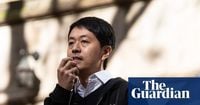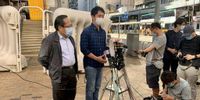After years in political limbo, former Hong Kong lawmaker and pro-democracy activist Ted Hui has been granted asylum in Australia, a move that has stirred both relief and sorrow among supporters and drawn sharp criticism from Hong Kong authorities. Hui, who left Hong Kong in late 2020 facing criminal charges over his role in the city’s 2019 pro-democracy protests, received official confirmation from the Australian Department of Home Affairs on Friday, August 15, 2025. His wife, children, and parents were also granted visas, allowing the family to reunite and begin a new chapter in Adelaide, where Hui now works as a solicitor.
Hui’s journey from the legislative chambers of Hong Kong to political exile in Australia has been fraught with risk, uncertainty, and deep personal cost. In a Facebook post on Saturday, Hui expressed gratitude to the Australian government for recognizing his need for protection, but his words also carried a heavy sense of loss. “When people around me say ‘congratulations’ to me, although I politely thank them, I can’t help but feel sad in my heart. How to congratulate a political refugee who misses his hometown?” he wrote, according to Reuters. “If it weren’t for political persecution, I would never have thought of living in a foreign land. Immigrants can always return to their home towns to visit relatives at any time; Exiles have no home.”
Hui’s case is emblematic of the wider crackdown on dissent in Hong Kong following Beijing’s imposition of a sweeping national security law in 2020. The law, which criminalizes acts deemed as secession, subversion, terrorism, and collusion with foreign forces, has been used to target activists, journalists, and politicians alike. In 2023, Hong Kong authorities accused Hui and seven other overseas activists of national security offenses, including incitement to secession, and placed HK$1 million (about US$130,000) bounties on their heads. The bounties, criticized by Western governments as largely symbolic, serve as a chilling reminder of the risks facing exiled activists.
Hui’s time in Australia has not been without danger. Earlier this year, an anonymous letter was sent to his Adelaide office, offering $203,000 for information on his whereabouts and that of his family. In a further attempt at intimidation, fake pamphlets falsely accusing Hui of being a pro-Israel lawyer willing to “wage war” against Islamic terrorism were reportedly mailed to mosques in Adelaide. Despite these threats, Hui has remained vocal in his criticism of Hong Kong and Beijing authorities, and he has called on the Australian government to do more for those who remain imprisoned in Hong Kong, including pro-democracy media tycoon Jimmy Lai, who has been behind bars since 2020.
“Australia must do more to rescue them and to speak up for their humanity,” Hui urged in his social media post, as reported by The Guardian. “Its stance matters internationally, and its protection of Hong Kongers sets a precedent for other democracies.” He added, “I and my family will give back to Australia in every way we can – through our work, our civic engagement, and our commitment to the values of democracy and freedom.”
The Hong Kong government’s response was swift and unequivocal. In a statement, officials declared, “Any country that harbours Hong Kong criminals in any form shows contempt for the rule of law, grossly disrespects Hong Kong’s legal systems and barbarically interferes in the affairs of Hong Kong.” They emphasized that those who abscond should not think they can evade “criminal liability.” This sentiment was echoed in earlier statements, with the government asserting its opposition to “the harbouring of criminals in any form by any country.”
Australia’s decision to grant Hui asylum comes at a delicate time in its relationship with China. Just last month, Prime Minister Anthony Albanese visited Beijing as part of a years-long effort to improve diplomatic ties after a period of heightened tension. Yet, the Albanese administration has consistently voiced concerns about the broad and extraterritorial application of Hong Kong’s national security law. Australian Foreign Minister Penny Wong reiterated this stance on social media, stating, “Freedom of expression and assembly are essential to our democracy. We have consistently expressed our strong objections to China and Hong Kong on the broad and extraterritorial application of Hong Kong’s national security legislation, and we will continue to do so.”
For Hui and other exiled activists, the bounties placed on their heads by Hong Kong authorities may be largely symbolic, given that countries like Australia and the United Kingdom are unlikely to extradite political dissidents. Nevertheless, the psychological and reputational effects are real. “The bounties are considered largely symbolic given they affect people living abroad in nations unlikely to extradite political activists to Hong Kong or China,” noted The Guardian. Yet, the existence of such bounties and the willingness of some to try to collect them—even anonymously—highlight the ongoing risks faced by dissidents who have fled abroad.
Hui is not alone in seeking refuge from Hong Kong’s tightening grip. Fellow activist Tony Chung, who was sentenced to three years and seven months in prison in 2021 for secession and money laundering, announced this weekend that he had been granted asylum in Britain. Meanwhile, Jimmy Lai, the founder of the now-shuttered pro-democracy newspaper Apple Daily, remains on trial in Hong Kong on charges related to the national security law and alleged sedition. Lai’s case, like Hui’s, has drawn international attention and condemnation from advocates of press freedom and human rights.
The Australian Department of Home Affairs, citing privacy concerns, has declined to comment on individual cases. However, the government’s actions speak volumes about its stance on human rights and political asylum. Australia’s willingness to offer sanctuary to Hui and his family, despite the potential diplomatic fallout with China, signals a commitment to democratic values—even as it seeks to balance those ideals with pragmatic engagement in the region.
As Hui settles into life in Adelaide, his story remains a powerful reminder of the personal costs of political activism in an increasingly authoritarian world. For now, Hui’s focus is on rebuilding his life and contributing to his new community, but he continues to speak out for those who cannot. “Exiles have no home,” he wrote, capturing the bittersweet reality faced by so many forced to leave behind everything familiar in the pursuit of freedom and safety. The question now is whether Australia and other democracies will heed his call and do more to protect those still at risk.


